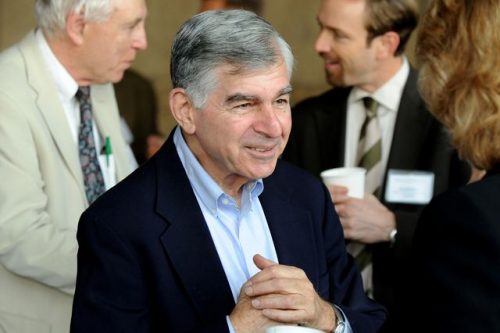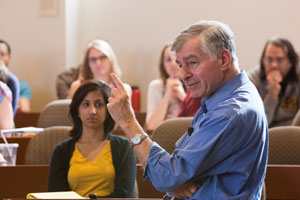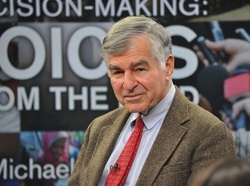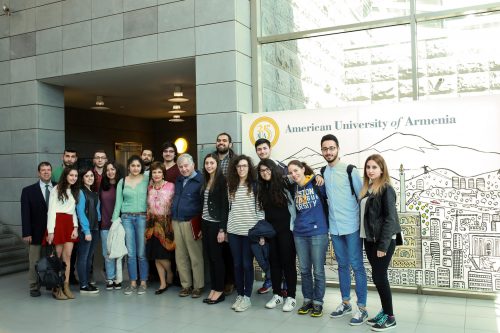Ex-presidential candidate says he is on a mission to energize young political scientists at UCLA and other campuses, where there is a resurgence of interest in public policy.
February 03, 1999|KENNETH R. WEISS | TIMES EDUCATION WRITER
He slips into a meeting of student activists for a quick chat and poses a question to the assembled students: “How old were you when I ran for president?”
“Eight,” one student answers.
“Nine,” says another.
“If you don’t know who I am, you are not alone,” says the former Massachusetts governor. “I was walking through the [Westwood] Village and a guy ran up to me said, ‘It’s so good to meet you, Gov. Deukmejian.’ ”
Dukakis is teaching at UCLA again this winter. Although apathy reigns supreme on campus, junior political scientists jam into his public policy classes.
Who better, after all, to teach them about public policy than the biggest policy wonk of them all?
And so Dukakis hardly seems to care that his place in history–getting trounced by George Bush 11 years ago–has slipped out of the minds of most college students.
For he is on a new political quest, to convince America’s youth that “public policy is a noble profession,” as he told his students on the first day of class.
“My mission in life is to energize people,” Dukakis said. “I think guys like me, after we have wrapped up our political careers, ought to be missionaries for the calling.”
His message, as spin doctors might say, resonates with a growing audience. UCLA’s three-year-old School of Public Policy and Social Research is in a growth spurt, as are other public policy schools, attracting students hungry for solutions after years of frustration with political bickering, crisis management and government gridlock.
Pepperdine has launched a public policy school, and Dukakis drew an overflow crowd last month to its 520-capacity theater with a lecture: “Surprise! This Is a Great Time for Public Service.”
USC is erecting a building for its public policy school, a merger of its urban planning and public administration programs. Undergraduate enrollment has grown sevenfold since 1994.
“The West Coast used to be devoid of the programs,” said Erik Devereux, director of the Assn. for Public Policy Analysis and Management in Washington, D.C. “Now they’re sprouting all over the place.”
Any surging appeal of policy studies seems to run contrary to student opinion surveys, which show that interest in politics and current affairs is at an all-time low.
Yet for the first time in many years, anti-government rhetoric has subsided in both Washington and Sacramento, as “mend-it-don’t-end-it” Democrats have taken the top jobs.
Even the notorious government-bashers in Congress have toned down their rhetoric. The turning point came after the bombing of the federal building in Oklahoma City, when conservatives drew criticism for stirring up militia violence with their heated language. There also appear to be more jobs for policy wonks, not just in government but also in the private sector, to do policy analyses under government contract.
All this has made public policy careers more appealing to students drawn to politics.
“Most of us are sick of watching nothing get done,” said UCLA senior David Esselman. The political science major wants to join Al Gore’s presidential campaign when he graduates.
For now, Esselman–who fought for a seat into Dukakis’ class–jots down every acronym: MTA, AFDC, MWD, FDA. He drinks in every word Dukakis utters about state water policy, overburdened highways and aging infrastructure.
“California politicians never have any guts, they never stand up? Is that it?” Dukakis asks the class. “Or is it more difficult to tackle these problems these days?”
Co-teaching the class, professor Daniel J. Mitchell handles most of the logistics. Dukakis is more the public policy cheerleader, a role that spills outside the classroom during the three months he’s here.
Dukakis, a full-time political science professor at Northeastern University in Boston, teaches there in the fall, spring and summer. That leaves the winter term open for him to come to UCLA, as he has done for four years. It gets him and wife Kitty out of the New England winters and closer to their son, who lives in Santa Monica, and daughter in San Francisco.
UCLA Chancellor Albert Carnesale calls Dukakis an “enormous asset” on campus, not only for bringing his experience into the classroom, but also for serving as a mentor.
Indeed, a steady stream of students stop by to visit him.
Unlike most professors at the research university, he settles into his office in the morning and makes himself available all day. “I think this publishing thing is out of control,” Dukakis said. “These kids need us.”
His door is always open. He answers his own phone.
“It tripped me out when I first called him,” said Jennifer Chadorchi, a junior in political science. “He said, ‘How can I help you?’ I said I wanted to come see him and he said, ‘Come over right now.’ ”
“Can you imagine a student who is 18 or 19, to walk straight into his office, with no security or nothing?”
Dukakis wound up writing a letter of recommendation for Chadorchi, landing her an internship this summer in the White House.
As a favor to one of his students, Dukakis treks across campus to address the group of activists. He praises the 60 students for their volunteer work and encourages them to do more.
“You have a chance to make a difference, not sit on the sidelines and moan and groan about it,” he tells them. “I hope some of you will even run for office. Who was I? A son of immigrants. Funny name. And yet . . . ”










